Winning at Blackjack: Effective Strategies Explained
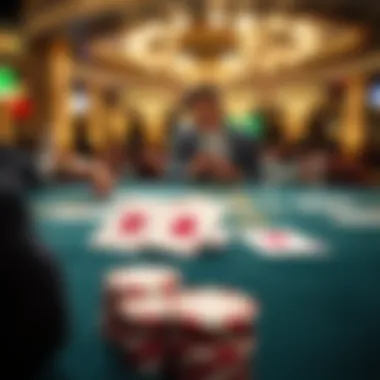
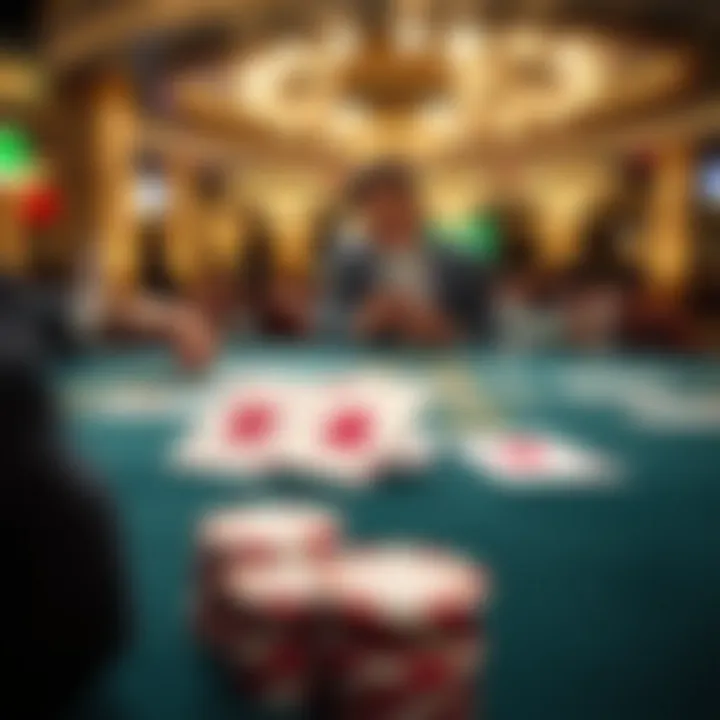
Intro
Blackjack, often dubbed as the ‘game of 21’, holds a special place in the hearts of many gamblers. Beyond its glitzy appearance in movies and the thrilling backdrop of casinos, the game is steeped in strategy and statistical nuances. For both novice players and seasoned aficionados, mastering the art of blackjack requires more than just luck; it demands a solid grasp of gameplay mechanics and an understanding of the psychology at play. In this article, we will explore effective strategies to enhance your chances at the blackjack table.
Whether you're playing in a bustling casino or lounging at home in an online setup, the techniques discussed are designed to elevate your game. The journey starts here, as we dissect the essential elements of blackjack, combining statistical insights with psychological tactics that can turn the odds in your favor.
Gameplay Strategies
Understanding Game Mechanics
At the core of mastering blackjack is a comprehensive understanding of its game mechanics. It’s essential to note that blackjack is not merely a random draw of cards; it follows a structured set of rules and probabilities. Players aim to beat the dealer by getting a hand as close to 21 as possible without exceeding it.
The value of the cards is fundamental:
- Cards 2 through 10 hold their face value.
- Face cards (Kings, Queens, and Jacks) each hold a value of 10.
- Aces can be 1 or 11, depending on which value benefits your hand more.
Knowing when to hit (draw another card), stand (stop drawing), double down (double the bet and draw one additional card), or split pairs (divide two of the same cards into two separate hands) is critical. Basic strategy charts, which illustrate optimal moves against any dealer's up-card, can serve as helpful guides while gaining experience. By familiarizing yourself with these charts, you can systematically improve your decision-making process.
Advanced Betting Techniques
Once you grasp the basics, it’s time to explore advanced betting techniques that can further enhance your gameplay. Consider utilizing the Martingale betting system, which involves doubling your bet after each loss, aiming to eventually recover losses with a single winning bet. However, this technique can be quite risky if luck doesn't turn in your favor before you hit the table limits.
Another effective strategy is the Paroli system, which focuses on increasing your bet after a win, thereby harnessing streaks of good luck. This method aims to protect your bankroll by minimizing losses during slow rounds.
In addition, being mindful of the table rules and payout structures can provide significant advantages. For instance, games that pay 3:2 on a blackjack instead of 6:5, or those that allow players to surrender, can notably tilt the odds in your favor.
Tips for Responsible Gambling
Setting Limits and Budgeting
While the excitement of blackjack is undeniable, maintaining responsible gaming practices is crucial. Establishing clear limits on both losses and wins can help prevent emotional decisions that often lead to gambling troubles. Crafting a detailed budget helps ensure that your gaming remains fun and does not bleed into other areas of your life.
- Set a strict win and loss limit before you start playing.
- Only wager what you can afford to lose.
- Consider using cash for your betting rather than credit, as it feels more tangible and can help you stick to your limits.
Recognizing Problem Gambling Signs
Understanding the signs of problem gambling is essential. It's easy to get lost in the thrill of the game. Look for these common signs:
- Constantly thinking about gambling or planning your next session.
- Chasing losses, betting more to try to win back what you've lost.
- Borrowing money to gamble, indicating a dependency on gambling as a source of income or escape.
Balancing your gaming experience is vital; take breaks regularly, and if you feel overwhelmed, reach out for help. Responsible gambling resources are available at organizations such as the National Council on Problem Gambling (www.ncpgambling.org).
Remember, the ultimate goal of blackjack is to enjoy the game, not just to try and win. By employing effective strategies and keeping your gameplay balanced, you can make the most of your blackjack experience.
Foreword to Blackjack
Blackjack is a game that combines skill, strategy, and a touch of luck, making it a favorite among gamblers worldwide. The importance of understanding Blackjack isn't just about the thrill—it’s about making informed decisions, increasing your odds of winning, and enhancing the overall casino experience. Being well-versed in this game can transform a casual player into a strategist who knows when to stand firm or take risks.
The Origins of Blackjack
The roots of Blackjack can be traced back centuries, with various theories surrounding its invention. One tale suggests that the game originated in France around the 1700s, known then as Vingt-et-Un, which translates to Twenty-One. The French brought the game to the Americas, and it gradually morphed into the version we know today. This evolution was influenced significantly by regional adaptations and cultural preferences, shaping the game’s rules and styles.
Today, Blackjack stands out for its simple yet captivating gameplay, drawing players from different backgrounds. Understanding its origins offers insights into its current rules and strategies, underscoring its deep connection to gambling culture.
Understanding the Game Mechanics
At its core, Blackjack is straightforward: players aim to have a hand total closer to 21 than the dealer without going over. The value of cards is simple: numbered cards hold their face value, while face cards—kings, queens, and jacks—are worth ten, and aces can be worth either one or eleven.
This basic structure belies the underlying complexity. The mechanics of Blackjack involve various gameplay decisions that impact a player’s chances of winning. Players can hit, stand, double down, or split pairs, each decision with its own strategic implications. Here’s a brief breakdown of these terms:
- Hit: Draw another card to try for a better total.
- Stand: Keep your total as is and let the dealer play.
- Double Down: Double your original bet and receive one additional card.
- Split: Divide two of the same cards into two separate hands.
Understanding these mechanics is crucial for any player looking to excel. Getting comfortable with these actions and recognizing the scenarios in which to utilize them can enhance gameplay significantly.
"Knowing when to hold 'em and when to fold 'em" is especially relevant in Blackjack, where decision-making plays a pivotal role in the player’s success.
By familiarizing oneself with these foundational elements, a player sets the stage for deeper strategic explorations, paving the way towards mastering more advanced techniques as the game progresses.
Fundamental Rules of Blackjack
Understanding the fundamental rules of blackjack is not just an exercise in memorization; it forms the very backbone of strategic gameplay. Knowing these rules inside and out can significantly tilt the odds in a player's favor. The melodies of chips clacking and cards flipping become music to the ears when players are not just engaged, but also informed.
One essential aspect to consider is how the card values and scoring work. Unlike many card games where players might get tripped up by a suit or a trump, blackjack standardizes card value to create a neat framework. The numbered cards from 2 to 10 hold their face value. However, the face cards—Kings, Queens, and Jacks—are all worth 10. The Ace, that pivotal card, can be worth either 1 or 11, depending on what serves the player's hand best. This flexibility adds a layer of depth to decision-making.
Another critical reason the rules matter is because they dictate the game's flow. Every action a player can take, be it hitting, standing, doubling down, or splitting pairs, stems from these core rules. For new players, understanding what each action entails before sitting at the table can mean the difference between winning and losing.
Ultimately, mastering the rules doesn't just set the foundation for success; it creates a robust strategy for tackling varied scenarios. As players grow in confidence, having a solid grasp of the basic tenets allows for the smoother adoption of more complex strategies, which will be discussed later in the article. Therefore, getting aquainted with the rules isn't optional—it's a necessity.
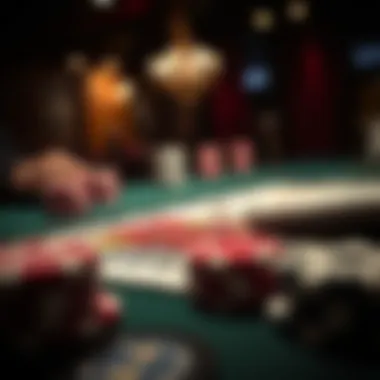
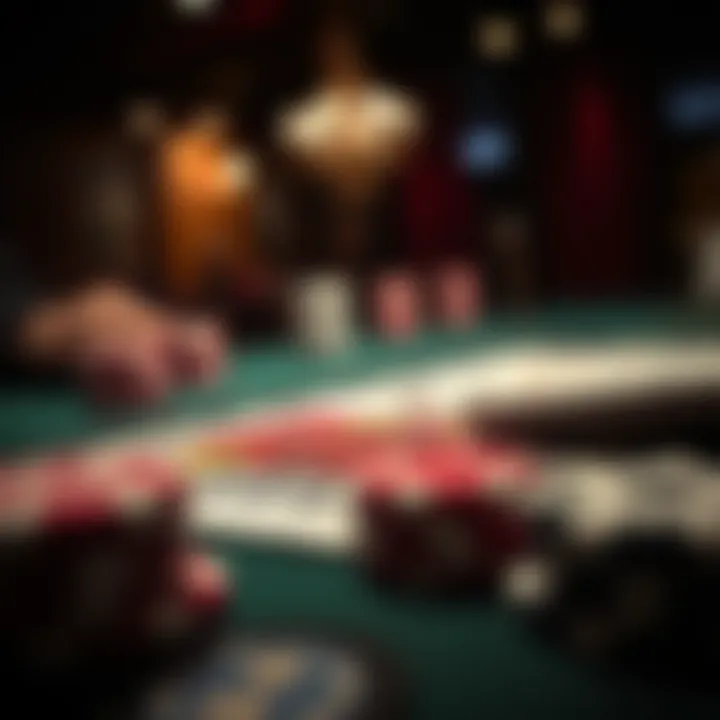
Card Values and Scoring
The card values and scoring system in blackjack resembles a well-organized structure under which the entire game plays out. As mentioned earlier, understanding these values is pivotal.
- Cards 2-10: retain their nominal values.
- Face Cards (Kings, Queens, Jacks): all push the score to 10.
- Ace: Heads and shoulders above the rest, it can be 1 or 11, depending on the situation at hand.
For instance, a hand containing an Ace and a 7 can either score 8 or 18. The ability to shift between these values creates numerous pathways to victory.
The end goal is not merely to accumulate points; it's to beat the dealer without exceeding 21. If a player’s hand exceeds this number, they go bust and lose the round. This fundamental scoring system is at the heart of every play, calling for tactical decisions especially when evaluating risks versus rewards.
Gameplay Format and Player Actions
Conducting oneself in blackjack follows a specific format governed by some laid-out rules. The details here can profoundly affect a player's success.
The game typically starts with players placing their bets before the dealer shows their cards. Each player is dealt two cards, usually facing up, while the dealer has one card facing up and another facing down, shrouded from view. Once these initial hands are dealt, players must decide one of several possible actions:
- Hit: Requesting an additional card to get closer to 21. A player must be careful here; the more they ask, the riskier the path.
- Stand: Ending the turn and keeping the current hand. Sometimes less is more.
- Double Down: Doubling the original bet after the first two cards in exchange for only one additional card. This can be a game-changer if played wisely.
- Split: When the first two cards are of the same value, players can choose to split them into two separate hands with an additional bet. This can carve open more opportunities, but it comes with its own set of risks.
As every player takes turns following the established format, patience and foresight come into play. A thorough understanding of when to act, and the implications of each action, is crucial. Skipping over these basics for flashy techniques can lead to pitfalls, preventing players from achieving the success they desire at the blackjack table.
Essential Blackjack Strategies
Understanding effective strategies in blackjack is crucial for anyone looking to enhance their gameplay. The beauty of blackjack lies not just in luck but in the skillful application of strategies that can sway the odds in a player's favor. This section delves into foundational approaches that any gambler can incorporate to improve their odds and ultimately their winnings. Whether lounging in a casino or navigating an online platform, these strategies form the bedrock of sound decision-making at the table.
Employing essential strategies allows players to maximize their returns while minimizing losses. It’s like having a map while wandering through the maze of a sprawling casino; without it, you might just find yourself lost or worse, losing more than you intend. Let’s explore what these strategies entail.
Basic Strategy Overview
At the core of any effective blackjack strategy is the Basic Strategy. This strategy is rooted in statistical probabilities and serves as a guideline on how to play every possible hand against the dealer's face-up card. It essentially takes the guesswork out of decision-making, allowing players to approach each hand with calculated moves.
- Understanding Hand Combinations: Each blackjack hand brings unique scenarios. Basic strategy involves knowing when to hit, stand, double down, or split cards based on the dealer's visible card. For instance, if your hand totals 16 and the dealer shows a 10, Basic Strategy would suggest hitting, as the dealer is likely in a stronger position.
- Minimizing the House Edge: Using the Basic Strategy effectively can lower the house edge to about 0.5%. This means that for every $100 wagered, you are likely to lose only $0.50 in the long run, which is noteworthy when juxtaposed with the potential losses associated with reckless play.
- Adjust for Variations: It’s also essential to adapt to the specific rules of the blackjack variant you are playing—whether that’s traditional, European, or other versions. Familiarity with these rules can tweak your application of Basic Strategy accordingly.
Without doubt, learning this strategy is a no-brainer for the serious player. It transforms the game from a gamble into a calculated endeavor.
Utilizing the Blackjack Strategy Chart
A powerful complement to the Basic Strategy is the Blackjack Strategy Chart. This chart is a player’s best friend, providing a visual guide to help you make informed decisions based on the hand you’re holding and the dealer's up card.
- Visual Aid: The chart lays out the necessary actions in a grid, displaying your hand along one axis and the dealer's up card on the other. For example, if you possess a soft 17 (Ace and 6) and the dealer is showing a 3, the chart might recommend doubling down.
- Memorization vs. Reference: While some players may choose to memorize a simplified version of the chart, others might prefer having it on hand as a reference during gameplay, especially for beginners. Online platforms often allow players to have quick access to these tools.
- Avoiding Error: This chart helps avoid common mistakes that can occur in the heat of a game. Many players succumb to emotional decision-making, but having a chart allows for rational, statistics-driven choices.
In essence, when used properly, the Blackjack Strategy Chart becomes a foundation for disciplined gameplay, removing much of the guesswork and emotional rollercoaster that often accompanies the game.
Advanced Techniques for Success
When it comes to dominating at the blackjack table, understanding advanced techniques can be a game-changer. It's not just about luck or hitting that sweet 21; employing precise methods can significantly tilt the odds in your favor. The beauty of these strategies lies in their foundation of mathematical principles and behavioral psychology, making you not only a better player but also a more confident one. These techniques elevate your gameplay, transforming the experience from mere chance to strategic warfare.
Card Counting Explained
Card counting often brings to mind images of rain men and intense focus, but it can be a more straightforward approach than most think. At its core, card counting works by keeping track of the high and low cards that have been dealt. While basic knowledge of the game is essential, mastering this technique involves familiarizing yourself with a few key systems.
One popular method is the High-Low System. Under this system, the player assigns values to the cards:
- Cards 2 through 6 = +1
- Cards 7 through 9 = 0
- Cards 10 and up (including face cards and aces) = -1
As you play, you maintain a running count based on these values. A positive count indicates a higher ratio of high cards remaining in the deck, which is advantageous for the player. Conversely, a negative count alerts you to a deck favoring the dealer.
Here are a few tips to make your card counting effective:
- Always practice your counting technique away from the table.
- Be discreet; counting cards can draw unwanted attention from casinos.
- Combine card counting with betting strategies for better results.
This method, however, isn’t an end-all. It requires diligence, consistent practice, and, most importantly, patience. The nuances of card counting can significantly improve your expected outcome, especially in a game heavily centered around probabilities.
Betting Systems and Their Effectiveness
Betting systems are another layer to consider when strategizing your game plan. Many players flock to various systems with the hope of increasing their winnings. However, it’s essential to recognize the limitations they may impose.
Commonly discussed systems include:
- Martingale System: Doubling your bet after each loss, aiming to recover what you’ve lost once you hit a winning hand.
- Paroli System: A positive progression system where you increase your bet after a win, hoping to capitalize on streaks.
- Fibonacci System: Based on the Fibonacci sequence, this method adjusts your bets according to the numbers in the sequence.
Each system has its merits and demerits; for example, while Martingale relies on the gambler's fallacy — the idea that a win is overdue — it might lead to hefty losses in the long run. The Paroli system, while appealing for capitalizing on winning streaks, may leave you vulnerable to rapid losses if luck turns.
Ultimately, no betting system can assure winning outcomes. The success largely depends on gameplay, situational awareness, and having a solid grasp of the game's underlying mathematics. Instead of relying solely on these systems, it's often better to see them as guidelines and have a balanced approach that combines strategic betting with skillful play.
End
Understanding these advanced techniques is paramount for those looking to elevate their blackjack game from simple enjoyment to serious strategy. Whether it's mastering card counting or weighing the effectiveness of various betting systems, these skills can provide a more profound comprehension of the game, allowing for informed decision-making. By blending technique with practice, players can cultivate not only a stronger strategy but also an astute understanding of player dynamics and table behaviors, vital for sustained success in blackjack.
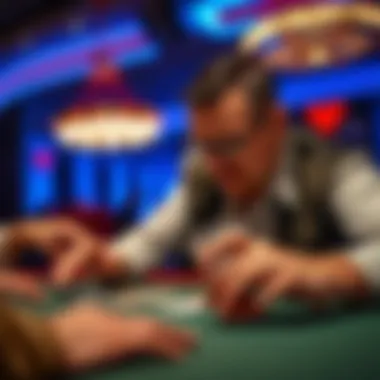
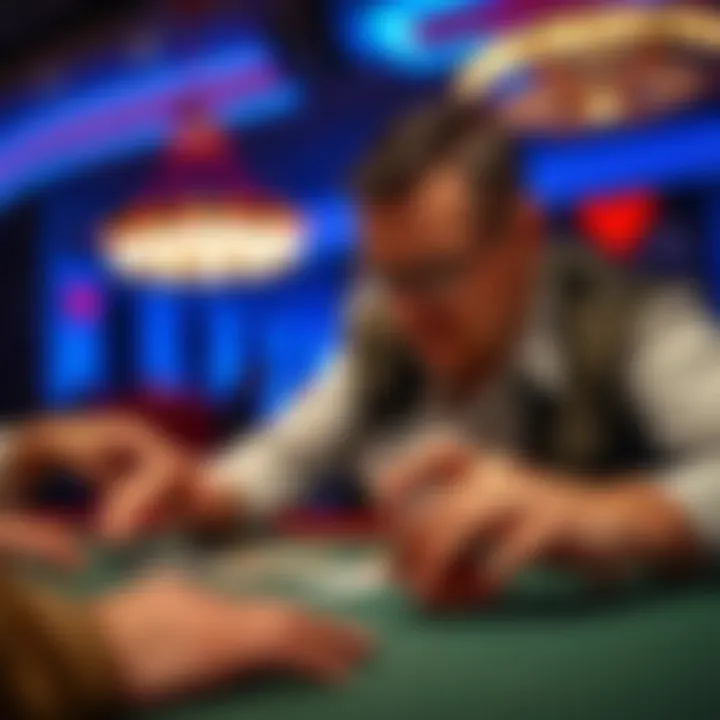
Understanding Probability and Odds
In the landscape of blackjack, understanding probability and odds is not just a nice-to-have; it’s the very bedrock upon which winning strategies are built. Like the foundation of a well-crafted house, these concepts help players navigate through uncertainties at the blackjack table. Grasping these elements allows players to make informed decisions, effectively reducing risks and maximizing potential gains. The ability to compute probabilities enables one to assess the likelihood of various outcomes, ultimately granting an edge in gameplay.
Expected Value in Blackjack
Expected value (EV) is a term that often floats around casino circles, yet many don’t fully grasp its real weight in blackjack play. At its core, EV calculates the average outcome of a strategy based on the probabilities of all possible outcomes. It’s akin to looking at the big picture rather than getting lost in interactions of the moment.
Imagine, for instance, that you’re deciding whether to hit or stand with a hard 16 against a dealer's upcard of 10. Understanding that the expected value of hitting in this situation may lead you to bust more often than not could shift your decision-making process. You might find that standing provides a better long-term outcome based on the likelihood of cards left in the deck.
To put it simply, if you constantly choose an action with a positive expected value, over time, you'll find your stack of chips growing more than shrinking.
"Mastering the expected value concept allows for a strategic framework, changing casual play into calculated maneuvers."
A breakdown of expected value illustrated through a simple calculation:
- Hit: Chances of busting = 60%. EV would be negative.
- Stand: Chances of winning the hand = 40%. EV is more positive when facing a weak dealer hand.
Ultimately, recognizing situations with high EV can strategically shape your gameplay approach.
House Edge and Player Decision Making
The house edge, often looming over players, signals the average profit margin for casinos over time. Typically, this is somewhere around 0.5% to 2% for skilled players using optimal strategies. Understanding the house edge can be a real eye-opener for players; it changes the narrative from a game of luck to a game of angles and adjustments. Picking your spots wisely is essential. If you know that standing with a certain hand against a specific dealer card lowers the house edge, you're empowered to make better choices.
When assessing your decisions, consider the impact of the house edge:
- Optimal Strategy: Using a basic strategy chart can significantly reduce the house edge, converting your gameplay into a thoughtful pursuit rather than mere chance.
- Mistakes and Impacts: Recognizing common pitfalls—like doubling down on poor hands—can keep the house edge at bay.
To fine-tune your decisions:
- Always analyze the table. That's where you'll spot those small edges.
- Adjust betting size in relation to your status in the game, avoiding rash moves — remember, patience and precision trump brashness.
Psychological Aspects of Blackjack
The realm of blackjack isn’t just about numbers or strategies; it’s equally about the mind. Understanding the psychological aspects of blackjack can tilt the odds in your favor, perhaps even more so than mastering the rules of the game. Being able to maintain emotional control, read the dynamics at the table, and understand the cognitive biases that influence decisions can provide players with a distinct edge. When one grasps these psychological facets, it leads to sharper decision-making and a more enjoyable gaming experience.
Managing Your Emotions
Keeping your emotions in check is crucial when playing blackjack. The ebb and flow of winnings and losses can trigger strong feelings—excitement after a win, frustration after a loss. Recognizing these impulses is the first step in preventing them from clouding your judgment.
Here are a few key strategies for managing your emotions:
- Set Limits: Before even stepping up to the table, decide on a losing limit and a winning goal. This limits the potential for reckless decisions that stem from emotional responses.
- Take Breaks: If you find your emotions running high, it’s wise to take a short break. Stepping away from the table allows you to return with a clearer head.
- Focus on Strategy: Instead of fixating on the outcomes of individual hands, concentrate on your strategies and decisions. This cognitive shift helps in minimizing anxiety related to wins and losses.
"The greatest battles a player faces are often with their own mind."
Reading Opponents and Dealer Behavior
The ability to read the room, so to speak, is another psychological strategy that can work wonders at the blackjack table. Paying attention to the behaviors and body language of both your fellow players and the dealer can reveal useful insights that inform your gameplay.
Consider these aspects when attempting to read your opponents and the dealer:
- Watch for Patterns: How does a player react after hitting or standing? These habits might indicate their confidence or hesitation, which can be crucial in predicting their next move.
- Dealer’s Face: Keep an eye on the dealer's demeanor and expression. A consistent, calm dealer sends a different signal than one who appears nervous or distracted.
- Group Dynamics: The atmosphere at the table can also impact behavior. If the group is tight-knit and focused, it could lead the players to play more conservatively.
The psychological components of blackjack are intricate and highly influential. Those willing to delve deeper into the mental game often find themselves reaping the rewards, both at the tables and beyond.
Online Blackjack Strategies
In the contemporary world of gambling, online blackjack has emerged as a popular choice for many. While traditional table play is still cherished, the introduction of digital gaming platforms offers unique advantages. Online blackjack strategies focus on exploiting these benefits while recognizing the differences between virtual and live experiences. Understanding this section will enhance your gameplay and decision-making processes, maximizing your chances of winning.
Differences Between Live and Online Play
Playing blackjack online versus at a live casino presents different dynamics that can influence strategy. Here are key differences to consider:
- Environment: A live casino has a social atmosphere with interaction between players and dealers. Online play, while sometimes offering live dealers, often feels more solitary. It's crucial to adapt your emotional responses based on whether you're face-to-face or just behind a screen.
- Pacing: Online games typically allow for faster rounds. This can lead to quicker decision-making, which can be advantageous or detrimental depending on your strategy. In a live setting, there's a natural pace set by the dealer and other players, allowing more time to think.
- Game Variants: Online platforms often provide a wide range of blackjack variants, some with unique rules that may not be available in-person. For example, there may be multi-hand or progressive betting options that can change the way you strategize.
- Convenience: You can play from anywhere at any time. This flexibility can help you avoid the fatigue or distractions sometimes found in a crowded casino environment.
Being aware of these distinctions can help you adjust your approach and particularly notice which strategies work best in each setting.
Utilizing Software and Tools
The advent of technology can give players a distinct edge. Here's how:
- Blackjack Trainers: Various software applications simulate the game and help you practice without financial risk. This allows players to hone their skills and familiarize themselves with different strategies.
- Betting Calculators: Tools that analyze potential outcomes and expected values can guide your betting actions, ensuring that you're always making informed decisions based on the probabilities involved.
- Strategy Charts: Online players can easily access and utilize blackjack strategy charts. These visual guides outline the best possible moves based on your hand and the dealer's upcard. While memorization is great, having a chart at your disposal means you can quickly refer to it during play, ensuring solid decisions.
"Using modern tools is not about replacing skill but enhancing it. Let them do the heavy lifting while you focus on the nuances of the game."
- Tracking Software: Some platforms allow you to monitor your wins, losses, and betting patterns. This analytical approach can help identify habits or mistakes over time. It’s akin to keeping a journal, but far more interactive and insightful.
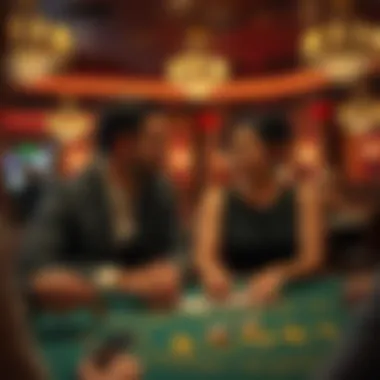

The integration of software and tools equips you with the knowledge and adaptability to navigate online blackjack effectively. By utilizing these resources, you can blend the art of strategy with the science of statistical analysis—creating a formidable approach to the table.
By understanding and applying these online-focused strategies, you can approach your next game with more confidence and insight. Leveraging the distinct features of online play ensures that you're not only prepared but primed for success.
Common Mistakes to Avoid
Understanding what mistakes to avoid is vital in maximizing your potential at the blackjack table. These common pitfalls can lead to significant losses and frustration, detracting from the enjoyment of the game. Identifying and rectifying these errors can turn the tide in your favor, enabling you to make informed decisions throughout your play.
Understanding Misconceptions
Misconceptions about blackjack are more widespread than one would think. Many newcomers believe that blackjack is primarily a game of luck. While luck does play a role, it's fundamentally a game of strategy and skill. For instance, some players may think that hitting on 12 against a dealer's 2 is a safe option. However, this choice is often misguided; embracing the basic strategy that advises standing in such scenarios can greatly improve your odds.
Another common fallacy relates to the belief that the dealer's actions can indicate anything about your card outcome. Some players read into the dealer's busts or holds as if they possess some mystical power to predict their own fortune. The reality is that every round of blackjack is an independent event. Thus, past results shouldn't dictate your approach in the present. Knowing these misconceptions can free you from unnecessary mental burdens— allowing you to engage with the game more effectively.
Financial Management Errors
Managing your bankroll effectively can be the difference between a well-fought game and a complete disaster. One of the most frequent financial management errors players make is failing to set a dedicated budget. Without a clear limit, it’s all too easy to get swept away by the excitement, only to find yourself regretting the lost funds later on. Setting clear limits before you even sit down at a table ensures that you approach the game with a calmer mindset.
Moreover, many players neglect the importance of adjusting their bets according to their bankroll. A general rule of thumb is to limit any single bet to around 1-5% of your total bankroll. This disciplined approach can cushion the impact of bad runs and make the game more sustainable in the long term.
Another crucial aspect is to avoid chasing losses. Going on tilt—a term used often in gambling circles—can lead players to make rash decisions, wanting to make back losses all at once. It’s vital to take a step back and re-evaluate your strategy. Observing your betting patterns can illuminate risks, helping you to regain control over your finances and maintain a level-headed approach.
"Discipline is the bridge between goals and accomplishment."
Learning how to navigate these common mistakes may not make you a card wizard overnight, but it sure sets the stage for your path to success in blackjack. By maintaining a solid understanding of the game mechanics and deploying a disciplined financial strategy, you enhance your chance of emerging victorious—and that’s what truly counts at the end of the day.
For more insights into effective blackjack play, consider resources like Wikipedia on Blackjack or community discussions on Reddit. Engage with fellow players to share strategies and experiences, allowing yourself to learn from both success and failure.
Responsible Gambling Practices
Responsible gambling is an essential aspect of enjoying blackjack and any other form of gambling. The excitement that comes with the thrill of the game should not overshadow the importance of playing wisely. By establishing responsible gambling practices, players can mitigate risk and enhance their overall experience at the tables. The goal is not merely to enjoy the game but to do so with a clear mind and a solid strategy, ensuring that the stakes are enjoyable and manageable.
A key component of responsible gambling is recognizing one’s personal limits. It's easy to be swept away by winning streaks or the hope of recouping losses. However, the best strategy involves making informed decisions based on one’s financial situation and emotional state. Setting limits is quite critical; players must understand that it’s perfectly fine to walk away.
"Gambling is a bit like a roller coaster—thrilling, but you need to keep one hand on the safety bar."
Setting Limits and Sticking to Them
Setting limits involves determining beforehand how much money and time one is willing to spend. This practice ensures that players do not exceed their budget or engage in prolonged sessions that could lead to poor decision-making. When players establish these boundaries, they’re more likely to play within their means and enjoy the activity without the pressure of financial strain.
Here are some effective strategies for setting limits:
- Monetary Limits: Determine a fixed amount of money to allocate for a gambling session. Once that limit is reached, stick to it.
- Time Limits: Decide how much time to spend playing before starting. It’s all too easy to lose track of time, so setting a timer can be beneficial.
- Win/Loss Limits: Establish goals for winnings or losses. For instance, “If I win $100, I will cash out; if I lose $100, I’ll step away for the day.”
Having these limits in place helps keep the fun in blackjack. If players find themselves consistently exceeding these limits, it might be a sign to reevaluate their approach to gambling.
Recognizing the Signs of Problem Gambling
Awareness plays a crucial role in responsible gambling. It’s important to be attuned to the signs that may indicate a gambling problem. Recognizing these signs early can facilitate quicker responses and preventive actions. Some typical indicators include:
- Increased Time and Money: Spending more time and money than intended can be a warning sign.
- Neglecting Responsibilities: If gambling starts interfering with personal, professional, or financial responsibilities, it’s time to reassess.
- Withdrawal Symptoms: Experiencing heightened anxiety or irritability when not gambling can signal a problem.
- Rationalizing Losses: Continually convincing oneself to keep playing in hopes of winning back losses is a common trap.
Should any of these behaviors become apparent, seeking help from friends, family, or professionals is a critical step. Resources such as Gamblers Anonymous and other support networks can provide the necessary assistance.
By practicing responsible gambling, individuals not only enhance their enjoyment of blackjack but can also maintain healthier relationships with their finances and emotional well-being. After all, gambling should be a source of entertainment rather than stress.
Final Thoughts on Winning at Blackjack
In the realm of gambling, particularly blackjack, the knowledge and application of effective strategies can truly make a difference in a player's experience and outcomes. This article has built a foundational understanding of blackjack, emphasizing not just the mechanics of the game, but also the psychological, statistical, and strategic facets that can enhance winning potential. Winning at blackjack isn’t solely dependent on luck; it’s a harmonious blend of skill, discipline, and acute awareness of the game's nuances.
By grasping key concepts, players arm themselves with the tools needed to navigate the table with confidence. These key elements include understanding card values, employing basic strategy, managing emotions, and recognizing common pitfalls. Adopting a methodical approach reduces reliance on chance and cultivates an environment where informed decisions reign supreme. Moreover, learning to gauge the psychological landscape—both your own emotions and those of the dealer—adds another layer of depth to gameplay, granting players an advantageous perspective.
However, even the most diligent players can falter when they overlook essential principles of responsible gambling. Establishing limits and recognizing the signs of problematic behaviors ensures that blackjack remains an entertaining pursuit rather than a detrimental obsession. Ultimately, balancing ambition with cautious foresight allows players to enjoy the game while safeguarding their financial and emotional wellbeing.
“The best way to predict your future is to create it.”
Thus, aspiring blackjack players should never underestimate the importance of ongoing education. The blackjack landscape continues to evolve. Learning from past experiences, revisiting strategies, and staying updated with emerging trends can amplify your gameplay significantly. Every hand dealt is a new opportunity, but seizing that potential requires a commitment to continual growth and understanding. With this approach, each session at the table becomes a stepping stone toward mastery, not just a gamble in the hope of fortune.”
Recap of Key Points
As we draw this discussion to a close, it's essential to recap the pivotal points that have been explored:
- Understanding the Game Mechanics: A firm grasp of card values and actions players can take is crucial for mastering blackjack.
- Basic and Advanced Strategies: From employing a basic strategy chart to implementing advanced techniques like card counting, players can vastly improve their odds.
- Psychological Factors: Recognizing and managing emotions, as well as reading the dealer’s behavior, can be game-changers at the table.
- Probability and Odds: Familiarity with expected value and the house edge influences decision-making significantly.
- Responsible Gambling: Setting clear limits and recognizing gambling issues ensures a healthy and enjoyable gaming experience.
These elements form a comprehensive framework that can equip players with the insights needed to navigate the complexities of blackjack more effectively.
Encouragement for Continuous Learning
Blackjack is not merely a game of luck; it is a dynamic pursuit that demands a commitment to learning and improvement. The landscape of poker, strategies, and even table environments are in constant flux. Staying abreast of changes and new methodologies through forums such as Reddit or reputable blackjack strategies found on sites like Wikipedia can really help players refine their skills.
It’s beneficial to reflect on personal experiences as well; taking note of what strategies worked and which didn’t allows one to adjust tactics for future games. Many successful players review their games, whether through self-reflection or discussion with peers. New strategies surface periodically, making it vital to stay engaged with the community and keep learning.
Moreover, consider investing time in simulations or software that offer practice without risk. These tools can provide invaluable insights into gameplay mechanics without the real-money stakes involved. Ultimately, a mindset of continuous growth will not only enhance your skills but also transform your overall experience at the blackjack table. This game, while traditionally viewed through the lens of chance, becomes a tapestry rich with strategy, psychology, and intellect the more you explore it.



